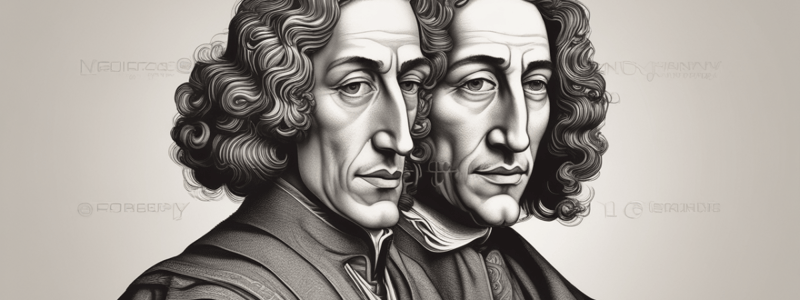Podcast
Questions and Answers
What happens to the mind when it entertains unclear ideas or is overwhelmed by passion?
What happens to the mind when it entertains unclear ideas or is overwhelmed by passion?
It feels weak and vulnerable, and experiences pain and confusion because it lacks clarity.
What is the highest pleasure, according to Spinoza?
What is the highest pleasure, according to Spinoza?
Understanding the laws of nature, which is equivalent to understanding God.
How does Spinoza distinguish between emotions and passions?
How does Spinoza distinguish between emotions and passions?
Emotions are linked to specific thoughts, while passions are not associated with any particular thought.
What is notable about Spinoza's treatment of human emotions?
What is notable about Spinoza's treatment of human emotions?
According to Spinoza, what is the relationship between God and nature?
According to Spinoza, what is the relationship between God and nature?
What is the significance of Spinoza's deterministic view of man?
What is the significance of Spinoza's deterministic view of man?
What is the similarity between Spinoza's philosophy and psychoanalytic thinking?
What is the similarity between Spinoza's philosophy and psychoanalytic thinking?
What is the name of Spinoza's solution to the mind-body problem?
What is the name of Spinoza's solution to the mind-body problem?
What is the most pleasurable life, according to Spinoza?
What is the most pleasurable life, according to Spinoza?
What is the significance of understanding the laws of nature, according to Spinoza?
What is the significance of understanding the laws of nature, according to Spinoza?
What is the role of reason in emotional experience, according to Spinoza?
What is the role of reason in emotional experience, according to Spinoza?
What is the central idea of Spinoza's deterministic view of human cognition and behavior?
What is the central idea of Spinoza's deterministic view of human cognition and behavior?
What is the significance of 'clear ideas' in Spinoza's philosophy?
What is the significance of 'clear ideas' in Spinoza's philosophy?
What is the closest we can get to freedom, according to Spinoza?
What is the closest we can get to freedom, according to Spinoza?
What is the fundamental nature of differences among all things in the universe, according to Leibniz?
What is the fundamental nature of differences among all things in the universe, according to Leibniz?
What is the driving force behind the development of a monad?
What is the driving force behind the development of a monad?
What is the unique characteristic of humans in terms of thinking, according to Leibniz?
What is the unique characteristic of humans in terms of thinking, according to Leibniz?
What is the concept that Leibniz proposed as an alternative to interactionism and occasionalism?
What is the concept that Leibniz proposed as an alternative to interactionism and occasionalism?
What is the term Leibniz used to describe perceptions that occur below the level of awareness?
What is the term Leibniz used to describe perceptions that occur below the level of awareness?
What is the concept that Leibniz introduced into psychology, related to the threshold of conscious awareness?
What is the concept that Leibniz introduced into psychology, related to the threshold of conscious awareness?
What is the significance of Leibniz's concept of unconscious perception in the development of psychoanalysis?
What is the significance of Leibniz's concept of unconscious perception in the development of psychoanalysis?
What is the implication of Leibniz's concept of hierarchy of consciousness for the study of animals?
What is the implication of Leibniz's concept of hierarchy of consciousness for the study of animals?
What is the fundamental unit of the universe according to Leibniz's philosophy?
What is the fundamental unit of the universe according to Leibniz's philosophy?
What happens when enough minute monads are experienced at the same time?
What happens when enough minute monads are experienced at the same time?
What is the main difference between Leibniz's and Locke's view on the mind?
What is the main difference between Leibniz's and Locke's view on the mind?
What is Leibniz's view on the origin of ideas?
What is Leibniz's view on the origin of ideas?
What is the hierarchy of nature in Leibniz's philosophy?
What is the hierarchy of nature in Leibniz's philosophy?
What is the significance of petites perceptions in Leibniz's philosophy?
What is the significance of petites perceptions in Leibniz's philosophy?
How does Leibniz's view on the mind differ from his understanding of Locke's view?
How does Leibniz's view on the mind differ from his understanding of Locke's view?
What is the nature of the universe according to Leibniz's philosophy?
What is the nature of the universe according to Leibniz's philosophy?
What is the primary assumption behind Thomas Reid's commonsense philosophy?
What is the primary assumption behind Thomas Reid's commonsense philosophy?
What is the name of the philosophical position that holds that sensory experience represents physical reality exactly as it is?
What is the name of the philosophical position that holds that sensory experience represents physical reality exactly as it is?
According to Reid, how do we perceive the world?
According to Reid, how do we perceive the world?
What is the term for the aspects of the mind that actually exist and influence human behavior and thought, according to Reid?
What is the term for the aspects of the mind that actually exist and influence human behavior and thought, according to Reid?
How many faculties of the mind did Reid identify?
How many faculties of the mind did Reid identify?
What is the significance of 'common sense' in Reid's philosophy?
What is the significance of 'common sense' in Reid's philosophy?
What is the criticism that Reid levels against those who doubt the existence of the physical world?
What is the criticism that Reid levels against those who doubt the existence of the physical world?
What is the relationship between the faculties of the mind, according to Reid?
What is the relationship between the faculties of the mind, according to Reid?
What did Immanuel Kant believe was the source of our understanding of concepts such as unity, causation, time, and space?
What did Immanuel Kant believe was the source of our understanding of concepts such as unity, causation, time, and space?
According to Kant, what is the role of the mind in shaping our experience of the world?
According to Kant, what is the role of the mind in shaping our experience of the world?
What is the categorical imperative, according to Kant?
What is the categorical imperative, according to Kant?
How did Kant's view of innate categories of thought differ from Descartes' view of innate ideas?
How did Kant's view of innate categories of thought differ from Descartes' view of innate ideas?
What was Kant's view on the nature of time and space?
What was Kant's view on the nature of time and space?
What did Kant compare the categories of thought to in his analogy?
What did Kant compare the categories of thought to in his analogy?
How did Kant's philosophy combine sensory experience and innate faculties?
How did Kant's philosophy combine sensory experience and innate faculties?
What is the significance of Kant's concept of innate categories of thought in psychology?
What is the significance of Kant's concept of innate categories of thought in psychology?
What did Kant believe was the result of elevating the maxim 'lying under certain circumstances is justified' to a universal moral law?
What did Kant believe was the result of elevating the maxim 'lying under certain circumstances is justified' to a universal moral law?
What is the relationship between the mind and the universe, according to Kant?
What is the relationship between the mind and the universe, according to Kant?
How does Kant define psychology, and what does he believe is possible to study?
How does Kant define psychology, and what does he believe is possible to study?
What is the Absolute, according to Hegel?
What is the Absolute, according to Hegel?
What is the dialectic process, according to Hegel?
What is the dialectic process, according to Hegel?
How does Hegel view the relationship between the individual and the state?
How does Hegel view the relationship between the individual and the state?
What is Herbart's contribution to psychology?
What is Herbart's contribution to psychology?
How does Herbart view ideas?
How does Herbart view ideas?
How does Hegel influence Fechner and the development of experimental psychology?
How does Hegel influence Fechner and the development of experimental psychology?
What is the significance of Hegel's philosophy in the development of Gestalt psychology?
What is the significance of Hegel's philosophy in the development of Gestalt psychology?
How does Freud's early consideration of the human will relate to Hegel?
How does Freud's early consideration of the human will relate to Hegel?
What is the significance of Hegel's philosophy in self-actualization theory?
What is the significance of Hegel's philosophy in self-actualization theory?
Why did Herbart deny that psychology could become an experimental science?
Why did Herbart deny that psychology could become an experimental science?
What is the concept of psychic mechanics, as described by Herbart?
What is the concept of psychic mechanics, as described by Herbart?
What is the apperceptive mass, according to Herbart?
What is the apperceptive mass, according to Herbart?
What advice did Herbart offer to teachers regarding the presentation of new material?
What advice did Herbart offer to teachers regarding the presentation of new material?
What is the significance of Herbart's concept of limen in the development of psychology?
What is the significance of Herbart's concept of limen in the development of psychology?
How does Herbart's view of ideas differ from that of the empiricists?
How does Herbart's view of ideas differ from that of the empiricists?
What is the significance of Herbart's mathematical approach to psychology?
What is the significance of Herbart's mathematical approach to psychology?
What is the relationship between an idea and the apperceptive mass, according to Herbart?
What is the relationship between an idea and the apperceptive mass, according to Herbart?
What is the significance of Herbart's work in the development of educational psychology?
What is the significance of Herbart's work in the development of educational psychology?
What is the similarity between Herbart's concept of ideas and Leibniz's concept of monads?
What is the similarity between Herbart's concept of ideas and Leibniz's concept of monads?
Flashcards are hidden until you start studying
Study Notes
Baruch Spinoza's Philosophy
- Equated God with nature, believing that everything in nature, including humans, consists of both matter and consciousness.
- Proposed solution to the mind-body problem is called double aspectism, where the mind and body are like two sides of a coin, inseparable and influencing each other.
Understanding of Human Cognition and Emotions
- Held a deterministic view of human cognition, activity, and emotion, facilitating the development of scientific psychology.
- Believed that emotional experience is desirable when controlled by reason, while passionate experience is undesirable because it is not controlled by reason.
- Distinguished between emotions and passions, with emotions linked to specific thoughts and passions not associated with particular thoughts.
Emotions and Passions
- Identified various emotions, including wonder, contempt, love, hatred, devotion, hope, fear, confidence, despair, joy, disappointment, pity, indignation, jealousy, envy, sympathy, humility, repentance, pride, honor, shame, regret, gratitude, revenge, cowardice, ambition, and lust.
View of Human Freedom and the Laws of Nature
- Believed that humans are part of nature, and therefore, human thoughts and behavior are lawful and determined.
- Insisted that the best life is one lived with a knowledge of the causes of things, and that understanding the laws of nature is key to freedom.
- Thought that the highest pleasure comes from understanding the laws of nature, which is equivalent to understanding God.
Key Concepts and Influences
- Embraced pantheism, believing that God is present everywhere and in everything.
- Eliminated the distinction between the sacred and the secular by equating God and nature.
- Denied demons, revelation, and an anthropomorphic God.
- Influenced the development of scientific psychology and psychoanalytic thinking.
Gottfried Wilhelm von Leibniz's Philosophy
- Leibniz believed that the universe consists of indivisible units called monads, which are the building blocks of the universe.
- God created the arrangement of monads, making this the best of all possible worlds.
- Leibniz attributed to Locke the belief that the mind is a tabula rasa (blank tablet), but disagreed, saying the mind is not passive, but active.
Monads and Consciousness
- Monads are life units, like living atoms, and all monads are active and conscious.
- There is a hierarchy in nature, with monads varying in clarity and distinctiveness of thoughts, making them differ in intelligence.
- Inert matter is made up of monads incapable of clear thoughts, while plants, animals, and humans have increasingly clear thoughts.
Purpose and Development
- Each monad seeks to clarify its thoughts, causing pleasure, and has a final cause or purpose.
- Monads can only change through internal development, actualizing their potential.
- Humans possess the monads capable of the clearest thinking, next to God.
Rejection of Dualism and Parallelism
- Leibniz rejected mind-body dualism, interactionism, and occasionalism.
- He proposed a psychophysical parallelism based on preestablished harmony, where mental and physical events are separate but synchronized.
Continuity and Perception
- The law of continuity states that there are no major gaps in nature, only small gradations.
- Leibniz introduced the concept of petites perceptions (little perceptions) that occur below awareness.
- Accumulated petites perceptions lead to conscious awareness, or apperception.
Unconscious Mind and Threshold
- Leibniz proposed the concept of an unconscious mind, where experiences below the limen (threshold) remain unconscious.
- Above the threshold, experiences become conscious.
- This idea influenced the development of psychoanalysis.
Thomas Reid
- Believed that our sensory impressions accurately reflect physical reality because it makes common sense to do so
- Attributed several rational faculties to the mind, making him a faculty psychologist
- Advocated for commonsense philosophy, which assumes the existence of the physical world and human reasoning powers because it makes sense to do so
- Trusted eyewitness testimony in courts of law as a reason to trust our impressions of the physical world
- Believed that we are naturally endowed with the abilities to deal with and make sense of the world
Direct Realism
- The belief that sensory experience represents physical reality exactly as it is
- Also known as naive realism
- Reid did not believe that our conscious awareness of the world is formed by one sensation being added to another
- Believed that we experience objects immediately as objects due to our innate power of perception
Faculties of the Mind
- Believed that faculties were aspects of the mind that actually existed and influenced human behavior and thought
- Thought that all faculties were innate and functioned in cooperation with other faculties
- Listed 43 faculties of the mind, including abstraction, attention, consciousness, deliberation, generalization, imitation, judgment, memory, morality, perception, pity, and compassion
Immanuel Kant
- Believed that experiences such as unity, causation, time, and space could not be derived from sensory experience and must be attributable to innate categories of thought
- Believed that morality should be governed by the categorical imperative
- Thought that psychology could not become a science because subjective experience could not be quantified mathematically
- Believed that the mind must add something to sensory data before knowledge could be attained
- Postulated innate categories of thought, such as unity, totality, time, space, cause and effect, reality, quantity, quality, negation, possibility-impossibility, and existence-nonexistence
- Thought that our sensory impressions are always structured by the categories of thought, and our phenomenological experience is the result of the interaction between sensations and the categories of thought
Categorical Imperative
- The moral directive that we should always act in such a way that the maxims governing our moral decisions could be used as a guide for everyone else’s moral behavior
- Kant gave the example of the maxim "lying under certain circumstances is justified" and how it would lead to widespread distrust and social disorganization if made a universal moral law
- Believed that if everyone made their moral decisions according to the categorical imperative, the result would be a community of free and equal members
Georg Wilhelm Friedrich Hegel
- Believed the universe to be an interrelated unity, which he called the Absolute
- Thought that human history and the human intellect progress via the dialectic process toward the Absolute
- Believed that true knowledge can never be attained by examining isolated instances of anything unless those instances are related to the "whole"
- Conceived the ethical relation of the citizen to the state as analogous to that of the eye to the body
- Developed the concept of the dialectic process, involving an original idea, the negation of the original idea, and a synthesis of the original idea and its negation
- Influenced Fechner and thereby the development of both psychophysics and the birth of experimental psychology
Johann Friedrich Herbart
- Likened ideas to Leibniz’s monads by saying that they had energy and a consciousness of their own
- Believed that ideas strive for consciousness and are given conscious expression if compatible with a person’s apperceptive mass
- Thought that psychology could be a mathematical science, but not an experimental science
- Opposed faculty psychology and believed that the activities of the mind could be expressed mathematically
- Developed the concept of apperceptive mass, which is the group of compatible ideas that gather in consciousness and form a group
- Applied his theory to education by offering advice to teachers on how to present new material to students
- Considered one of the first mathematical and educational psychologists
- Influenced Gustav Fechner and Wilhelm Wundt, the founder of psychology as a separate scientific discipline
Studying That Suits You
Use AI to generate personalized quizzes and flashcards to suit your learning preferences.




